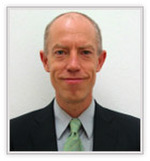4-1 Understanding and Translating Regulatory Inquiries from the Pharmaceuticals and Medical Devices Agency (PMDA)
ベン・トンプキンス
JAT理事
報告者●ジェームス・シングルトン(フリーランス翻訳者)
Pharmaceutical translator Ben Tompkins gave an enlightening presentation detailing the various ins and outs of translating regulatory queries related to pharmaceuticals. The presentation also included a mini-workshop.
The session began on a light note with Tompkins posing questions to the audience concerning their experience and interest in queries. He then dove in to introducing queries, or 照会事項, which, simplified, are requests from the Pharmaceuticals and Medical Devices Agency (PMDA) to pharmaceutical companies for clarification or information regarding specific aspects of a drug. A timeline showing how queries may be sent at any stage of development, from early R&D all the way to post-marketing, helped illustrate the critical role they play in a drug product receiving PMDA approval. Further background information was provided concerning the extreme sensitivity of queries, their flow between the PMDA and pharmaceutical companies, their structure and length, and other types of documents in the review process. Examples from publicly available review reports illustrated the structure and common language contained in queries and highlighted potential challenges to translators.
Focus was then turned to content of queries and the broader question of why a translator might consider working with them. Tompkins provided some positive aspects of translating queries, which included their wide range of content, the growing demand for their translation, the generally high-quality of writing contained in queries, and the excellent opportunity they provide a translator to contribute and have their work widely used. He also explained that for those just starting out in pharmaceutical translating, queries are a good place to get one’s feet wet and provide ample opportunities to catch mistakes and build one’s reputation with clients. On the down side, Tompkins pointed out that their wide range of content also means there is a lot to learn and take in. Other potential drawbacks of queries were that they are often provided in difficult to work with formats, such as scans of faxed documents, often contain long and difficult-to-parse sentence structures, and frequently come with odd working hours and quick turnarounds.
The presentation then moved to discussing translation strategies, with Tompkins strongly recommending a translator first assemble a toolkit, which he stressed should include the JAT Pharma Handbook as well as the freely downloadable PMDA Organization Chart and Pharmaceutical Administration and Regulations in Japan. He also recommended translators include organizational charts for pharmaceutical companies, as well as glossaries and blacklists of terms to avoid. Drawing on years of experience, Tompkins then provided tips for rendering queries into English, one of which was the acceptability of using the imperative even when the polite form is used in Japanese. Advice for avoiding common pitfalls included carefully considering how companies outside of Japan might perceive language in a query, avoiding the urge to rely on quick glosses or direct translations of terms, and adequately ensuring that translations accurately convey what the PMDA is asking. He stressed that translators should collect all necessary materials ahead of time and do their homework, carefully consider content before rendering, never over interpret or guess, and always ask the client when unsure. Regular communication with clients was specifically pointed to as a way to ensure efficiency and consistency.
The session ended with a highly instructive and participatory workshop which provided the audience an opportunity to try their hands at translating short queries as well as parsing complex passages.
Mr. Tompkins has generously offered to make the slides from his presentation available and asks anyone wishing to have a copy to email him directly at ben@j-translate.com.
講演資料のダウンロードはこちら
*ダウンロードには、参加者のみに別途メールでお送りしておりますパスワードが必要になります。

